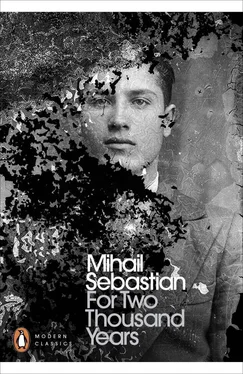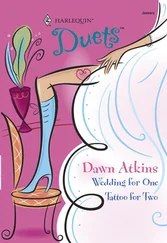‘It’s a curse, life with this husband of mine. I’m so embarrassed when neighbours call by to borrow a little tea or salt when they run out, and come across a fully grown man, talking to himself, to the walls, to the books. Now, tell me if you think that isn’t pure madness.’
I avoid a straight reply, so as not to add to conflict in the Sulitzer household, but my friend Abraham, at his table, besieged by books, shy and wise, smiles at me from behind his glasses, from behind the covers of a book opened wide — a smile of complicity (‘Let her talk, that’s how she is; women are like that; she’ll get over it’), the smile of a child who has upset a jam-jar and awaits his punishment.
I look at this kindly old man, who loves books with a passion, like an addiction. I look at this patient philosopher, terrorized by the nagging of a terrible wife, against whom he has no defence but a hidden smile, and I suddenly remember Monsieur Bergeret.
How well Abraham Sulitzer resembles him in this moment, surrounded by books. Abraham Sulitzer and Anatole France. A Yiddish-speaking Anatole France. What a blasphemer I am!
He shows me an entire library, full of surprises. A Yiddish translation of Cervantes. Molière, Shakespeare. And, nearer to us, Galsworthy, Dostoyevsky, Turgenev, Thomas Hardy. I’m amazed, he is triumphant. With every volume he places in my hands, he has a kind of smile of false modesty, like a host proud of the vintage wine he has served you, without announcing its quality, precisely in order to test you. However often I exclaim in surprise at a new discovery, he buries himself deeper between two covers, with an attempt at indifference which only half-hides his pleasure. And, when his triumph is decisive (a Jewish edition of Dante, printed magnificently on parchment, with tiny letters, as if engraved in wood), he can take it no longer and explodes almost furiously, struggling with I know not whom.
‘Beautiful? Beautiful you say? Beautiful like a puppy? Beautiful like a tie? No, sir, it’s not beautiful: it’s earth-shaking.’
His eyes burn — frowning for the first time. Roza, a little frightened, unsure what is happening, says nothing. Me, I feel embarrassed somehow. (I don’t like you, Abraham Sulitzer; I thought you were a serious sceptic, not an amateur, subject to tantrums.)
But he calms down quickly and becomes tolerant again. Now, with a little courage, perhaps my life may not even be in danger if I said — to test him — that I didn’t like a particular edition which inflames him with feeling. I don’t think he’d kill me; he’d settle for throwing me out.
The truth is that I am not in the mood for joking either and the revelations of his library open for me a world I never guessed existed. A culture in dialect? European culture in dialect. Why? For whom?
I ask Abraham Sulitzer and his reply this time is no longer excited or furious. It is sad.
‘I thought you’d ask. I’m surprised it took you so long. When it gets down to it, you’re no wiser than some street kid who runs after Jews with caftans, when one wanders along, shouting “Oy vey” and “Achychy azoy”. Dialect! Broken German! A ghetto language: that’s what Yiddish is to you. If I told you it was a language, neither a beautiful or ugly one, but a living one, through which people have suffered and sung for hundreds of years, if I told you that it’s a language containing everything in the world which has been pondered, you’d look at me, well, just as you’re doing now. Dialect indeed! It’s a living language, with nerves and blood, with its own troubles, its own beauty. With its own homeland, which is the ghetto — the whole world, in other words. It makes me laugh when I hear those Zionists talking Hebrew picked up from books. Is that what we need? Hebrew? With dictionaries, grammar and philology, or whatever they call it? God help them … Turning their backs on a healthy language to go searching in a tomb for a defunct one. God forgive me, I speak Hebrew myself after a fashion, having picked it up in my old age, but — what can I say? — to me it’s cold, harsh and empty somehow, like wandering through a long, long deserted stone hallway, without a single person or plant or window. How do you say “It hurts”, “I’m burning up” or “I miss you” in this language? And if you say it, does it do any good? Say “It hurts” in Yiddish — and you sense the pain. There’s blood there, it’s warm, it’s alive …’
‘I don’t know either of them well,’ I replied. ‘I wonder, though, to what degree you’re right, but — and I hope you don’t mind me saying this — I don’t think you’re entirely right. Yiddish is still a dialect — and that’s a serious problem. It’s a deformed language, derived from the corruption of another. Isn’t that a humiliating origin? I find it hard to believe that from the degeneration of one language you can create another.’
‘But that’s where your Zionists get it wrong. It’s not a case of a language that’s degenerated. It’s a case of another language altogether.
‘Yiddish is only ridiculous in the mouths of rich Jews with a Fräulein to take care of the kids who think that by speaking bad Yiddish they’re speaking good German. But real Yiddish, the straight Yiddish of a Jew without a Fräulein , is a living, breathing language. Millions of Jews speak it, millions live through it. For these millions are printed these books you see, for these millions Yiddish is written, translations are made into Yiddish, and Jewish theatre is performed. It’s a complete world, a complete people, with its own elite, without diplomas or universities. This elite wants to be informed, wants to know, wants to reflect.
‘There are Yiddish novelists, poets, critics and essayists. If you had any idea of the great beauties encompassed by this dialect-culture — which you ignorantly despise — you’d probably have many pangs of remorse. Not to mention the folklore of the ghetto — all in Yiddish — a still-living, creative folk-culture, with its roots deep in the periphery, with anonymous singers, unknown humourists, with heroes, with legends, with myths. And doubly alive. Once through the immediate presence of the life of the ghetto, and then through the more distant mystery of the life of the synagogue. The edgy, gritty urban realism of the ghetto and the mysticism of the synagogue unite in this folk-culture of the Jewish neighbourhood and together add up to something which, if you have an ear and a heart, is worth living and dying for.’
‘Dying, especially,’ I interjected, ‘because living through it is rather difficult. I can’t really see those millions of Yiddish speakers. And I don’t really see the Jewish ghetto either. But I do see a multitude of Jews passing definitively into the culture of the countries in which they live: French Jews, German Jews, American Jews and Romanian Jews. A hundred years ago they spoke in dialect. Today they’ve forgotten it. Tomorrow, their children won’t even remember that it once existed. And to such a precarious thing — however beautiful it may be — you want to bind a culture?’
‘Have you forgotten that, luckily, there are still anti-Semites? And, thank God, that there are still pogroms from time to time? However much you’re assimilated in a hundred years, you’ll be set back ten times as much by a single day’s pogrom. And then the poor ghetto will be ready to take you back in.’
‘Why a ghetto and not a Palestinian colony? You speak about the ghetto with so much passion, as though it were a place of exile, and with so much love about dialect, as if it were not a borrowed language. If it’s a matter of returning to ourselves, why don’t we return to where we first started, the place we left two thousand years ago? It’s not easy, either way. But if it’s going to be hard, it might as well be for once and for all.’
Читать дальше












